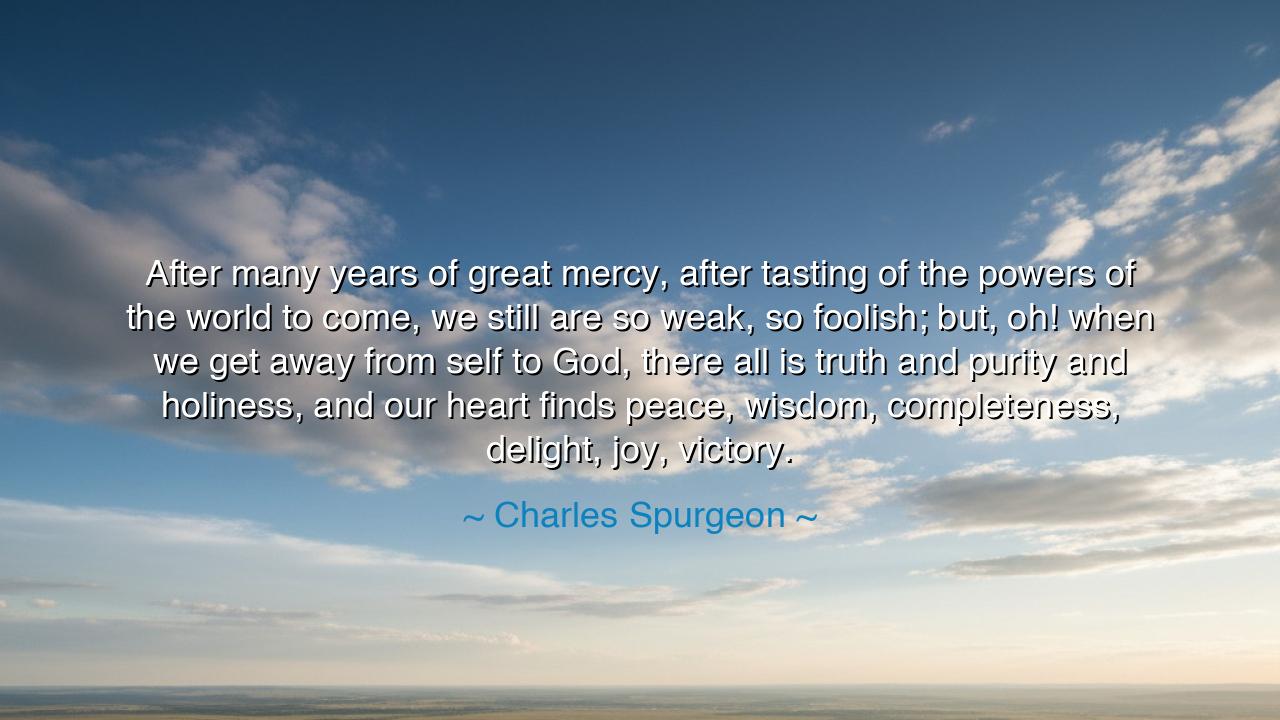
After many years of great mercy, after tasting of the powers of
After many years of great mercy, after tasting of the powers of the world to come, we still are so weak, so foolish; but, oh! when we get away from self to God, there all is truth and purity and holiness, and our heart finds peace, wisdom, completeness, delight, joy, victory.






“After many years of great mercy, after tasting of the powers of the world to come, we still are so weak, so foolish; but, oh! when we get away from self to God, there all is truth and purity and holiness, and our heart finds peace, wisdom, completeness, delight, joy, victory.” — Charles Spurgeon
These words from Charles Spurgeon, the “Prince of Preachers,” rise like a hymn from the depths of the human soul. In them, he captures the eternal struggle between self and God, between the frail heart of man and the infinite perfection of the divine. Spurgeon, though a man of immense faith and spiritual insight, confesses here what all the wise have learned — that human strength is weakness, and that only in surrender to God does the soul find peace. His cry is not of despair, but of holy longing: the yearning to escape the prison of self and enter the wide, radiant freedom of God’s presence.
For Spurgeon, as for the prophets and saints before him, the self is both the battlefield and the burden. We wrestle with pride, with doubt, with fear, believing ourselves wise and strong — yet in truth, we are but weak and foolish, grasping for light while standing in our own shadow. Even after “many years of great mercy,” after knowing the sweetness of divine grace, man is still drawn downward by his own nature. But Spurgeon reminds us that when the soul turns its gaze from self toward the eternal, something miraculous happens: the fog lifts, and there dawns within a peace that surpasses all understanding — truth, purity, holiness, completeness, joy, victory.
The origin of this wisdom lies deep in the soil of Christian experience, and its roots reach back to Scripture itself. The apostle Paul, who called himself the “chief of sinners,” wrote that when he was weak, then he was strong — for in weakness, the strength of God is revealed. Likewise, Augustine, the great bishop of Hippo, wandered for years in the wilderness of self before finding rest in God, writing, “Our hearts are restless until they rest in Thee.” Spurgeon stands in this lineage — the chorus of voices declaring that self-reliance leads to turmoil, but surrender to God leads to peace.
Consider the story of King David, the shepherd who became ruler of Israel. He knew victory and he knew sin; he tasted glory and he tasted guilt. Yet in his psalms, he did not glorify his own achievements. Instead, he confessed his failings and found strength only in returning to God. “Create in me a clean heart, O God,” he prayed, “and renew a right spirit within me.” This is the very heart of Spurgeon’s message: that holiness and joy are not rewards for perfection, but gifts bestowed when the soul abandons itself to grace.
The power of this teaching lies in its paradox. To “get away from self” sounds like loss — and yet it is liberation. To surrender seems like defeat — yet it is victory. The ego tells us to strive, to assert, to control; but the spirit whispers, “Be still, and know that I am God.” Spurgeon understood that the more we cling to our own wisdom, the more we are troubled; but the moment we let go, we are carried by a wisdom far greater than our own. In the death of self, the divine life begins.
This lesson is not only for the devout but for all who seek inner peace in a restless world. The ancient philosophers taught similar truths. The Stoic Epictetus spoke of aligning one’s will with the will of the universe; the mystics of the East taught the dissolving of the ego into the greater harmony of being. Spurgeon gives this universal wisdom its Christian heart: to live not by our own power, but by trust in the divine mercy that guides all things toward good.
Therefore, O listener, take these words as a lamp for your path: Cease striving, and surrender to the divine will. Do not despair of your weakness, for it is the doorway through which grace enters. Do not seek completeness in the self, for it lies only in communion with the Eternal. Each time you turn from pride to prayer, from anxiety to trust, you step closer to the peace Spurgeon speaks of — that deep stillness in which all confusion fades and the heart finds its true home.
And when the storms of life arise, remember this: to leave self for God is to win the greatest victory. For in that surrender, all is made whole — wisdom replaces folly, peace conquers fear, and the weary heart finds at last what it has always sought: the joy of resting in divine completeness.






AAdministratorAdministrator
Welcome, honored guests. Please leave a comment, we will respond soon